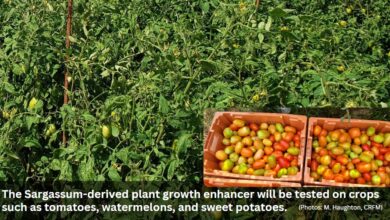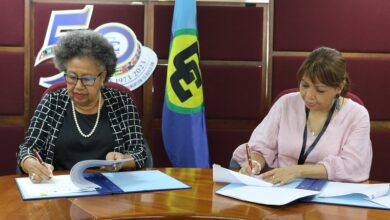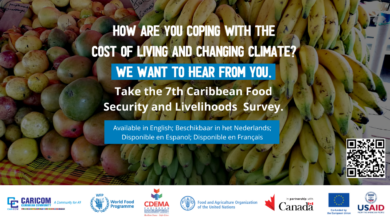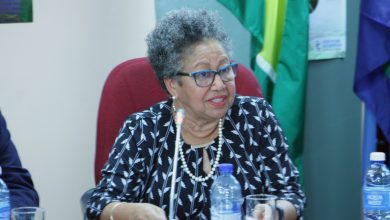(CARICOM Secretariat, Turkeyen, Greater Georgetown, Guyana) It gives me great pleasure to make a few remarks on this occasion, as we witness the signing of the Contribution Agreement between the European Commission and the Inter-American Institute for Cooperation on Agriculture (IICA). This Agreement puts on stream the Caribbean component of the 10th European Development Fund – Intra-ACP Agriculture Policy Programme. The overall Intra-ACP Programme has a financial envelope of €20.0 million provided by the European Union, of which €8.6 million have been allocated for implementation of the Caribbean Programme.
This Agreement establishes the fundamental legal, technical, financial and project implementation principles that will guide the relationship between the Project’s principal implementing agency, IICA and the European Commission. The Caribbean Agricultural Research and Development Institute (CARDI) and the CARICOM Secretariat are implementing partners along with IICA.
This programme exemplifies the strength of the partnership between IICA and the CARICOM/CARIFORUM Secretariat as IICA implements this activity on behalf of CARIFORUM. It also reflects the continued commitment of the European Union to the on-going development of our Region.
CARIFORUM, in its capacity as the ultimate Beneficiary of the Programme, has signed with IICA, a Memorandum of Understanding which will complement efforts aimed at getting the best results out of this Programme. The MOU sets out the conditions under which IICA has agreed to implement the programme on our behalf.
The implementation of this vital Programme comes at a time of significant challenges for the Caribbean in general, and the sixteen states of CARIFORUM in particular. It is a time when our states have no choice but to improve their competitiveness, with a view to achieving greater economic viability and sustainability. That competitiveness would put us in good stead as we seek to take advantage of the Economic Partnership Agreement (EPA) with the European Union.
The essence of the Programme’s interventions is informed by the results of a series of consultations with the key players in the agricultural sector in CARIFORUM. These included senior public and private sector regional agriculture sector stakeholders; representatives of the Caribbean Farmers Network (CAFAN) – which has made its mark on our Region; the Caribbean Network of Rural Women Producers (CANROP); Caribbean Agriculture Business Association (CABA); and the Caribbean Forum for Youth in Agriculture (CAFY).
Institutions which were involved included the Forest and Agricultural Resources Research Institute of the Dominican Republic (IIRAF); CARDI; IICA; and the Food and Agriculture Organization (FAO – Regional Office). I must note that there has been a strong tripartite relationship among IICA, FAO and the CARICOM Secretariat.
The content of the Programme has also been informed by the agriculture sector development issues of CARICOM’s Liliendaal Declaration and the Jagdeo Initiative on the nine Key Binding Constraints to agricultural development, as well as the key objectives of the sector as outlined in the Revised Treaty of Chaguaramas. The Programme’s design also benefited from several CARICOM policy instruments including: the Community Agricultural Policy; the Regional Food and Nutrition Security Policy and Action Plan; the Common Fisheries Policy; the Agri-business Strategy; the Draft Community Industrial Policy; and the Draft Biotechnology Policy. Some of this work was funded under the 9th EDF by the European Union and the FAO. These instruments have clearly not been for archival purposes as they have been used to inform programmes such as this one and are used to guide projects.
The Programme is specifically designed to further strengthen policy regimes and incentive schemes for smallholders across the Region who form the bulk of producers. It would also improve food security by increasing production and productivity of selected commercially and nutritionally valuable agricultural produce. It is intended to deepen the sector’s technological and organisational capability and contribute to the further enhancement of regional sectoral institutional capacity. In other words, the Caribbean component of the Intra-ACP Agriculture Policy Programme aims to boost the economic growth potential and capacities of smallholders in the agricultural sector, while increasing its contribution to regional economic growth and development.
It is also important to note that there is a specific bias to women and youth as these groups have been identified as important to the sustainability of the sector.
Although the Contribution Agreement does not cover this issue, the inter-regional component of the overall ACP Programme is of significant interest to CARIFORUM. It promotes cooperation in agriculture between the Caribbean and the Pacific region. The potential areas of cooperation include bananas and coconuts, two cash crops of economic significance to the Region.
Mr Chairman, Mr President, the CARICOM Secretariat will remain actively and dutifully engaged in providing its dedicated support to implementation activities under this 10th EDF Intra-ACP Agriculture Policy Programme, during the Programme’s four-year life cycle. We look forward to its successful implementation.
In closing I would like thank the European Union and IICA as well as other stakeholders for their assistance in building this most important sector of our Region.
I thank you.






